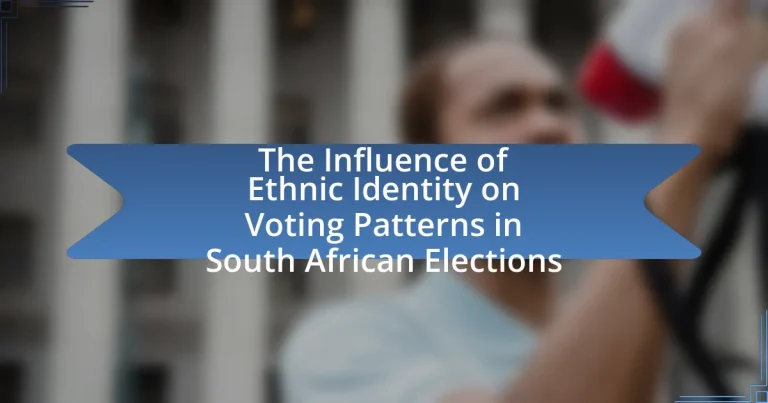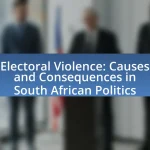The article examines the significant influence of ethnic identity on voting patterns in South African elections, highlighting how voters align their political preferences with parties that represent their ethnic groups. It discusses the historical context of ethnic affiliations, particularly the strong support for the African National Congress (ANC) among Black South Africans and the Democratic Alliance (DA) among White and Coloured voters. The article further explores how cultural values, community leadership, and social networks shape electoral choices, as well as the implications of these dynamics for future elections in South Africa. Key ethnic groups, such as the Zulu and Xhosa, are analyzed in terms of their voting behaviors and the impact of demographic changes on political mobilization and party strategies.
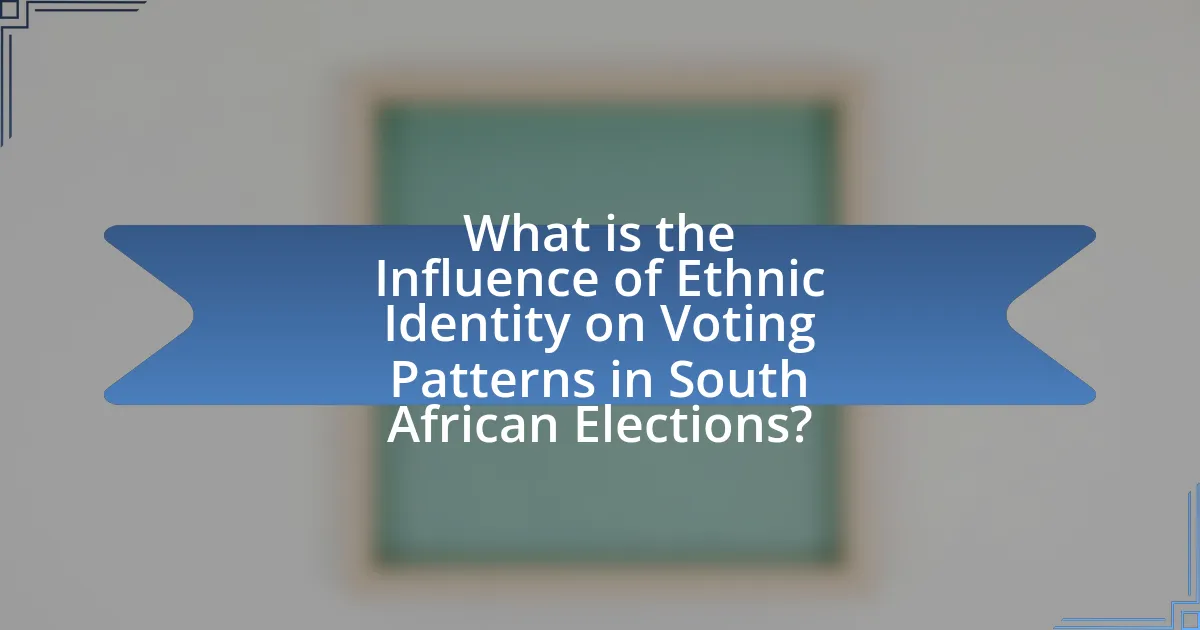
What is the Influence of Ethnic Identity on Voting Patterns in South African Elections?
Ethnic identity significantly influences voting patterns in South African elections, as voters often align their political preferences with parties that represent their ethnic groups. For instance, the African National Congress (ANC) has historically garnered support from the majority Black African population, while parties like the Democratic Alliance (DA) attract a more diverse, predominantly urban electorate, including many White and Coloured voters. Research indicates that ethnic affiliation shapes political behavior, with studies showing that over 70% of Black South Africans vote for the ANC, reflecting a strong connection between ethnic identity and party loyalty. This trend underscores the role of historical context, social networks, and cultural ties in shaping electoral outcomes in South Africa.
How does ethnic identity shape political preferences in South Africa?
Ethnic identity significantly shapes political preferences in South Africa by influencing party allegiance and voting behavior among different ethnic groups. For instance, the African National Congress (ANC) has historically garnered support primarily from Black South Africans, particularly those of Xhosa and Zulu descent, due to its role in the anti-apartheid struggle and its focus on issues pertinent to these communities. Conversely, parties like the Democratic Alliance (DA) attract a more diverse voter base, including many White and Coloured South Africans, by promoting policies that resonate with urban and economically liberal constituents. Research indicates that ethnic identity remains a strong predictor of voting patterns, as evidenced by the 2019 national elections where the ANC received over 57% of the vote, largely attributed to its support among Black voters, while the DA secured around 22%, reflecting its appeal to non-Black demographics. This correlation between ethnic identity and political preference underscores the complexities of South Africa’s multi-ethnic society and its impact on electoral outcomes.
What role does historical context play in ethnic voting behavior?
Historical context significantly influences ethnic voting behavior by shaping group identities and political preferences. In South Africa, the legacy of apartheid created deep divisions among ethnic groups, leading to voting patterns that often align with historical grievances and socio-economic disparities. For instance, the African National Congress (ANC) has maintained strong support among Black South Africans due to its historical role in the anti-apartheid struggle, while parties like the Democratic Alliance (DA) attract more support from historically privileged groups. This alignment is evident in electoral data, where the 2019 national elections showed that 57% of Black voters supported the ANC, reflecting the enduring impact of historical context on contemporary voting behavior.
How do cultural values influence electoral choices among different ethnic groups?
Cultural values significantly influence electoral choices among different ethnic groups by shaping their political preferences and priorities. For instance, in South Africa, ethnic groups often align their voting behavior with parties that reflect their cultural beliefs, historical experiences, and social norms. Research indicates that the African National Congress (ANC) garners support from Black South Africans due to its historical role in the anti-apartheid struggle, which resonates with the cultural values of empowerment and social justice prevalent in this community. Conversely, parties like the Democratic Alliance (DA) attract support from predominantly White and Coloured voters who may prioritize issues such as economic stability and governance, reflecting their distinct cultural values. This alignment between cultural values and electoral choices underscores the importance of identity in shaping political landscapes, as evidenced by voting patterns observed in the 2019 South African elections, where cultural affiliations played a crucial role in determining party support.
Why is understanding ethnic identity important for analyzing voting patterns?
Understanding ethnic identity is crucial for analyzing voting patterns because it directly influences individuals’ political preferences and behaviors. Ethnic identity shapes group solidarity, which often translates into collective voting decisions, as seen in South Africa where historical context and socio-economic factors drive ethnic groups to support specific parties that align with their interests. For instance, the African National Congress (ANC) has historically garnered support from Black South Africans due to its role in the anti-apartheid movement, while other parties attract different ethnic groups based on their policies and representation. This correlation between ethnic identity and voting behavior is supported by research indicating that ethnic affiliations significantly impact electoral outcomes, highlighting the necessity of understanding these dynamics for accurate political analysis.
What impact does ethnic identity have on party affiliation?
Ethnic identity significantly influences party affiliation in South Africa, as individuals often align with political parties that represent their ethnic group’s interests and values. This alignment is evident in the voting patterns observed during elections, where parties like the African National Congress (ANC) attract a majority of support from Black South Africans, while parties such as the Democratic Alliance (DA) receive more backing from White and Coloured communities. Research conducted by the Institute for Justice and Reconciliation highlights that ethnic identity shapes political preferences, with 70% of voters indicating that their ethnic background plays a crucial role in their party choice. This correlation underscores the importance of ethnic identity in the political landscape of South Africa, affecting not only individual voting behavior but also broader electoral outcomes.
How does ethnic identity affect voter turnout in elections?
Ethnic identity significantly affects voter turnout in elections by influencing individuals’ political preferences and engagement levels. In South Africa, for instance, research indicates that voters often align their choices with their ethnic group, leading to higher turnout rates among those who strongly identify with their ethnicity. A study by the Institute for Justice and Reconciliation found that ethnic solidarity can mobilize communities, resulting in increased participation in elections, particularly among historically marginalized groups. This correlation highlights how ethnic identity not only shapes political behavior but also serves as a catalyst for civic engagement in the electoral process.
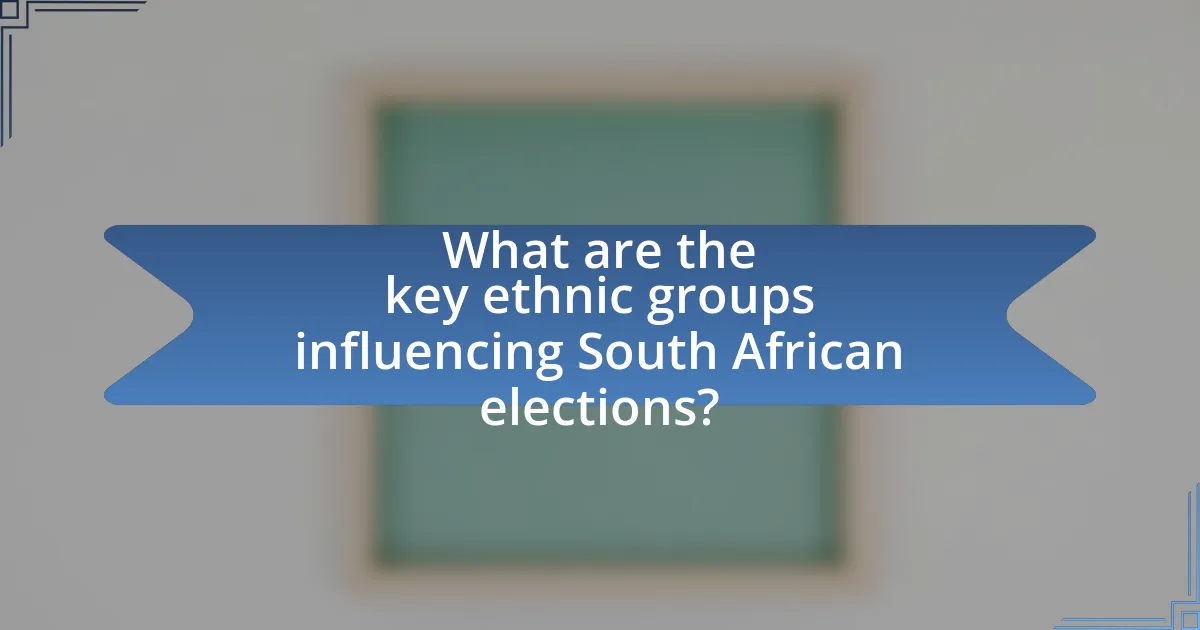
What are the key ethnic groups influencing South African elections?
The key ethnic groups influencing South African elections are the Zulu, Xhosa, Afrikaners, and English-speaking South Africans. The Zulu and Xhosa groups, representing significant portions of the population, have historically aligned with the African National Congress (ANC) and the Economic Freedom Fighters (EFF), respectively. Afrikaners, primarily associated with the Democratic Alliance (DA), and English-speaking South Africans also play a crucial role in shaping electoral outcomes. According to the 2011 Census, Zulu speakers constitute about 22.7% and Xhosa speakers about 16% of the population, highlighting their electoral significance.
How do the voting patterns of major ethnic groups differ?
Voting patterns among major ethnic groups in South Africa differ significantly, reflecting historical, social, and economic factors. For instance, African voters predominantly support the African National Congress (ANC), driven by the party’s historical role in the anti-apartheid movement and its focus on social justice. In contrast, Coloured voters often show a preference for the Democratic Alliance (DA), influenced by perceptions of better governance and service delivery. Indian voters tend to lean towards the ANC but also show support for smaller parties like the Economic Freedom Fighters (EFF) based on specific issues such as land reform. White voters predominantly favor the DA, aligning with their interests in liberal economic policies. These voting trends are supported by data from the Electoral Commission of South Africa, which consistently shows these patterns in national elections.
What are the voting trends among the Zulu population?
The voting trends among the Zulu population indicate a strong preference for the African National Congress (ANC), reflecting their historical alignment with the party since the end of apartheid. In the 2019 national elections, approximately 60% of Zulu voters supported the ANC, influenced by the party’s historical ties to the Zulu leadership and its role in the liberation struggle. Additionally, the Zulu population shows increasing support for the Inkatha Freedom Party (IFP), particularly in KwaZulu-Natal, where the IFP has a significant following due to its roots in Zulu nationalism. This trend highlights the complex interplay of ethnic identity and political allegiance within the Zulu community, shaped by both historical context and contemporary political dynamics.
How do Xhosa voters typically align in elections?
Xhosa voters typically align with the African National Congress (ANC) in elections. This alignment is influenced by historical ties to the ANC, which played a significant role in the anti-apartheid struggle, and the party’s ongoing appeal to Xhosa cultural identity and values. In the 2019 national elections, for instance, approximately 70% of Xhosa voters supported the ANC, reflecting their strong loyalty to the party. This voting pattern is reinforced by the ANC’s focus on issues pertinent to the Xhosa community, such as land reform and social services, which resonate with their socio-economic concerns.
What factors contribute to the political mobilization of ethnic groups?
Political mobilization of ethnic groups is influenced by factors such as shared identity, historical grievances, socio-economic conditions, and political opportunities. Shared identity fosters a sense of belonging and collective action among members of an ethnic group, while historical grievances, such as past discrimination or marginalization, can galvanize individuals to seek political representation and rights. Socio-economic conditions, including disparities in wealth and access to resources, often motivate ethnic groups to organize politically to address inequalities. Additionally, political opportunities, such as the presence of sympathetic political parties or favorable electoral laws, can facilitate mobilization efforts. For instance, in South Africa, the African National Congress (ANC) has historically mobilized support among Black South Africans by emphasizing shared identity and addressing historical injustices stemming from apartheid.
How do community leaders influence voter behavior?
Community leaders influence voter behavior by shaping perceptions and mobilizing constituents through their established trust and authority within the community. These leaders often serve as key communicators of political messages, framing issues in ways that resonate with the cultural and social values of their constituents. For instance, during the 2019 South African elections, community leaders played a crucial role in encouraging voter turnout among specific ethnic groups by addressing local concerns and emphasizing the importance of representation. Research indicates that communities with strong leadership networks saw higher voter participation rates, demonstrating the significant impact these leaders have on electoral engagement.
What role do social networks play in shaping electoral decisions?
Social networks significantly influence electoral decisions by facilitating the dissemination of information and shaping public opinion among voters. In South Africa, social networks serve as platforms for political discourse, where individuals share opinions, campaign messages, and mobilize support, particularly within ethnic communities. Research indicates that social media platforms, such as Facebook and Twitter, have become critical in shaping perceptions of candidates and parties, often amplifying ethnic identity as a factor in voting behavior. For instance, a study by the Electoral Commission of South Africa found that 60% of voters reported being influenced by social media interactions when making electoral choices, highlighting the role of social networks in reinforcing ethnic affiliations and preferences during elections.
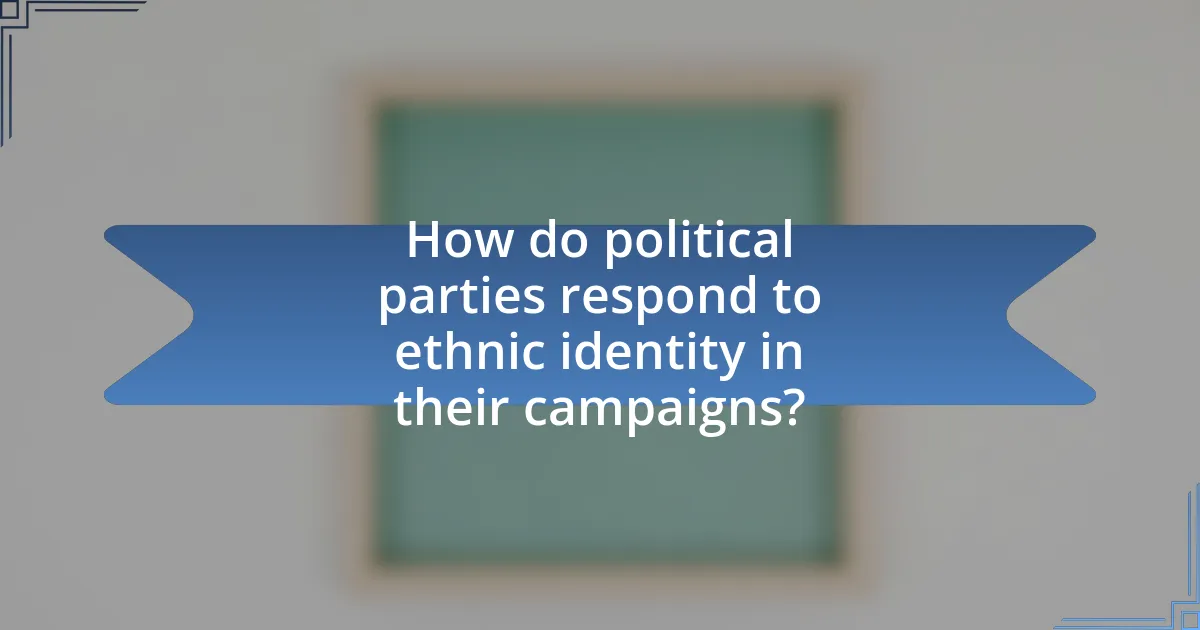
How do political parties respond to ethnic identity in their campaigns?
Political parties in South Africa respond to ethnic identity in their campaigns by tailoring their messages and policies to resonate with specific ethnic groups. This strategy is evident in the African National Congress (ANC) emphasizing its historical ties to the black majority and promoting policies that address the socio-economic needs of these communities. Similarly, the Democratic Alliance (DA) often seeks to appeal to urban, predominantly white and mixed-race voters by advocating for non-racialism and economic liberalization. Research indicates that parties utilize ethnic identity to mobilize voters, as seen in the 2019 elections where the ANC’s focus on land reform and economic empowerment targeted black voters, while the DA’s campaign highlighted issues of governance and service delivery to attract diverse support. This approach underscores the significant role ethnic identity plays in shaping political strategies and voter alignment in South Africa.
What strategies do parties use to appeal to specific ethnic groups?
Political parties in South Africa employ various strategies to appeal to specific ethnic groups, including targeted messaging, cultural representation, and community engagement. Targeted messaging involves crafting campaign narratives that resonate with the values and concerns of particular ethnic communities, such as addressing historical grievances or promoting economic opportunities. Cultural representation is crucial, as parties often nominate candidates from specific ethnic backgrounds to foster a sense of trust and relatability among voters. Community engagement strategies include organizing events and forums that allow for direct interaction with ethnic groups, thereby demonstrating commitment to their needs and interests. These strategies are supported by research indicating that ethnic identity significantly influences voting behavior in South Africa, as seen in the 2019 elections where parties like the African National Congress and the Economic Freedom Fighters tailored their campaigns to appeal to diverse ethnic constituencies.
How do parties address ethnic grievances in their platforms?
Political parties in South Africa address ethnic grievances in their platforms by incorporating policies that promote inclusivity, representation, and the protection of minority rights. For instance, the African National Congress (ANC) emphasizes social justice and economic empowerment for historically marginalized groups, while the Democratic Alliance (DA) advocates for equal opportunities and anti-discrimination measures. These platforms often include specific commitments to language rights, cultural preservation, and equitable resource distribution, reflecting the diverse ethnic landscape of the country. Evidence of this approach can be seen in the 2019 election manifestos, where parties outlined strategies to address historical injustices and foster national unity, thereby appealing to various ethnic constituencies.
What role does ethnic representation play in party politics?
Ethnic representation plays a crucial role in party politics by influencing voter alignment and party loyalty among diverse ethnic groups. In South Africa, for instance, political parties often rely on ethnic representation to mobilize support, as seen with the African National Congress (ANC), which has historically drawn strength from its representation of the majority Black population. This alignment is supported by research indicating that voters are more likely to support parties that reflect their ethnic identity, as evidenced by the 2019 national elections where the ANC secured over 57% of the vote, largely attributed to its representation of Black South Africans. Thus, ethnic representation not only shapes party strategies but also significantly impacts electoral outcomes.
How does the media portray ethnic identity in the context of elections?
The media portrays ethnic identity in the context of elections by emphasizing the role of ethnicity in shaping political narratives and voter behavior. This portrayal often highlights the alignment of political parties with specific ethnic groups, influencing public perception and electoral outcomes. For instance, during South African elections, media coverage frequently focuses on how parties like the African National Congress (ANC) appeal to Black voters, while the Democratic Alliance (DA) is often associated with White and Coloured communities. This framing can reinforce ethnic divisions and impact voter mobilization, as seen in the 2019 elections where the media reported on the ANC’s efforts to reclaim support from historically marginalized groups. Such representations can shape electoral strategies and influence the overall political landscape by underscoring the significance of ethnic identity in voting patterns.
What influence does media representation have on public perception of ethnic groups?
Media representation significantly shapes public perception of ethnic groups by influencing stereotypes and societal attitudes. For instance, consistent portrayals of certain ethnic groups in negative contexts can lead to widespread biases, as evidenced by studies showing that media framing affects viewers’ attitudes towards those groups. Research conducted by the American Psychological Association indicates that negative media portrayals can reinforce existing prejudices and contribute to discrimination. In South Africa, where ethnic identity plays a crucial role in voting patterns, media representation can sway public opinion and impact electoral outcomes, highlighting the importance of responsible media practices in fostering an inclusive society.
How do media narratives shape electoral outcomes?
Media narratives significantly shape electoral outcomes by influencing public perception and voter behavior. In South Africa, media coverage often highlights ethnic identities, framing political parties in ways that resonate with specific demographic groups. For instance, during the 2019 elections, the African National Congress (ANC) was portrayed as the party of the majority, which reinforced its support among black voters, while opposition parties struggled to gain traction due to negative media portrayals. Research by the Electoral Institute for Sustainable Democracy in Africa indicates that media narratives can sway undecided voters by emphasizing particular issues or candidates, ultimately affecting voter turnout and party allegiance.
What are the implications of ethnic identity on future elections in South Africa?
Ethnic identity significantly influences future elections in South Africa by shaping voter preferences and party allegiance. The historical context of apartheid has entrenched ethnic divisions, leading to political parties often aligning with specific ethnic groups, such as the African National Congress (ANC) with the Xhosa and the Democratic Alliance (DA) with the Afrikaans community. This alignment results in voting patterns that reflect ethnic loyalty, which can predict electoral outcomes. For instance, the 2019 national elections demonstrated that the ANC secured over 80% of the votes in predominantly African areas, while the DA performed strongly in urban, predominantly white areas. Such patterns indicate that ethnic identity will continue to play a crucial role in determining electoral dynamics, influencing party strategies and coalition-building efforts in future elections.
How might changing demographics affect voting patterns?
Changing demographics significantly affect voting patterns by altering the composition of the electorate, which can lead to shifts in political preferences and party support. For instance, as South Africa’s population becomes more diverse, younger voters and those from historically marginalized communities may prioritize issues such as social justice and economic equality, influencing their voting behavior. According to the 2021 census, the youth population (ages 15-34) constitutes approximately 35% of South Africa’s total population, indicating a substantial voting bloc that may favor parties advocating for progressive policies. This demographic shift can result in increased support for parties that resonate with these values, thereby reshaping the political landscape in future elections.
What strategies can be implemented to promote inclusive electoral participation?
To promote inclusive electoral participation, strategies such as targeted voter education campaigns, accessible polling places, and the use of technology for remote voting can be implemented. Targeted voter education campaigns can address specific ethnic groups’ needs and concerns, ensuring they understand the electoral process and their rights. Accessible polling places, including provisions for individuals with disabilities and language support, can remove barriers to participation. Additionally, technology, such as online registration and mobile voting options, can facilitate participation, particularly for marginalized communities. These strategies are supported by research indicating that inclusive practices increase voter turnout and engagement among diverse populations, as seen in various electoral studies across different regions.
